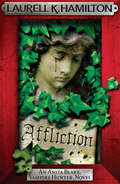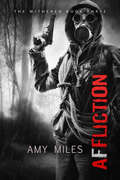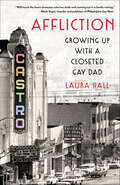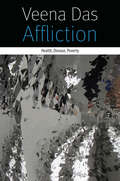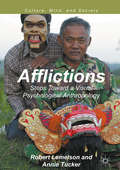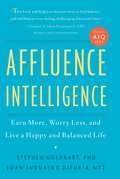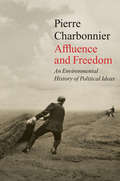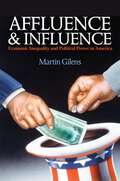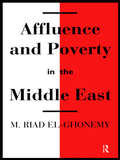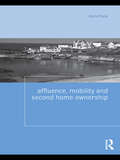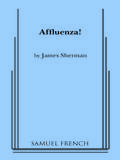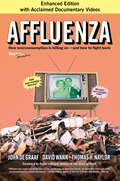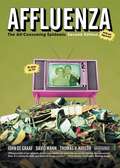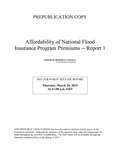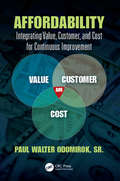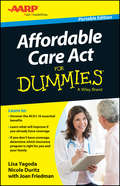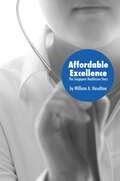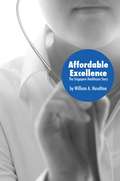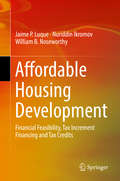- Table View
- List View
Affliction (Anita Blake, Vampire Hunter, Novels)
by Laurell K. HamiltonHad everyone bitten tonight caught this? The other bites had not looked like vampire bites. They'd been zombie, or human looking. Was this infection something that vampires and shapeshifters could catch? If it was, then it was something new. Some zombies are raised. Others must be put down. Just ask me, Anita Blake, Vampire Hunter. Before now, I figured I could handle them. Before now, I had never heard of any of them causing human beings to perish in agony. But that's all changed. Micah's estranged father lies dying, rotting away inside from some strange ailment that has his doctor's whispering about 'zombie disease'.I make my living from zombies - but these aren't the kind I know so well. These creatures hunt in daylight, and are as fast and strong as vampires. If they bite you, you become just like them. And round and round it goes ... Where will it stop? Even I don't know.
Affliction (The Withered Series #3)
by Amy MilesA woman on the verge of becoming a flesh-eating zombie fights to save the lives of others in this post-apocalyptic, science fiction horror novel.Though Avery Whitlock may have won the battle of the Grand Opry hotel, she knows the war is just beginning. Cable would stop at nothing to have her now that she was within his grasp—but to stay meant endangering innocent lives. No longer fully human and unwilling to accept her fate as a flesh-eating zombie, she must abandon the only place she could call home in order to save Nox and his people.Driven to prevent anyone else from suffering from the same fate, she follows the trail of the doctor responsible for the heinous mutations as he races to reach the Atlanta Safe Zone. But with spilled blood on her hands and malice in her heart, her cravings to kill become amplified—and her grip on her humanity begins to slip.Only the love of those closest to Avery can bring her back from the edge, but will they be able to reach her in time to save their own lives?
Affliction: Growing Up With a Closeted Gay Dad
by Laura HallIn 1937, at the age of nineteen, Ralph Hall, suicidal, revealed his sexual orientation to his grandmother, knowing she would comfort him. He was out for three years afterwards, until an indiscretion sent him back into the closet. At twenty-four, while in the army, he met and married Irene. The couple made their home on the San Francisco Peninsula and had four children. Ralph was an attentive husband and father—albeit with an intense interest in interior design, flower arranging, and fine objects—and a diligent worker who rose to payroll accountant at Standard Oil. It wasn't until 1975 that Ralph came out to his middle daughter, Laura, telling her that he had once considered his sexuality an aberration, an affliction. She was shocked, as the possibility her father might be gay had never crossed her mind. Irene had known Ralph’s secret for eighteen years, but the two remained married until she died. It was only then that this charismatic man and devoted father, by now in his eighties, could freely express his authentic, gay self.Here, Laura paints a vivid and honest portrait of her beloved father and the effect his secret had on her own life.
Affliction: Health, Disease, Poverty (Forms of Living)
by Veena DasAffliction inaugurates a novel way of understanding the trajectories of health and disease in the context of poverty. Focusing on low-income neighborhoods in Delhi, it stitches together three different sets of issues.First, it examines the different trajectories of illness: What are the circumstances under which illness is absorbed within the normal and when does it exceed the normal—putting resources, relationships, and even one’s world into jeopardy?A second set of issues involves how different healers understand their own practices. The astonishing range of practitioners found in the local markets in the poor neighborhoods of Delhi shows how the magical and the technical are knotted together in the therapeutic experience of healers and patients. The book asks: What is expert knowledge? What is it that the practitioner knows and what does the patient know? How are these different forms of knowledge brought together in the clinical encounter, broadly defined? How does this event of everyday life bear the traces of larger policies at the national and global levels?Finally, the book interrogates the models of disease prevalence and global programming that emphasize surveillance over care and deflect attention away from the specificities of local worlds. Yet the analysis offered retains an openness to different ways of conceptualizing “what is happening” and stimulates a conversation between different disciplinary orientations to health, disease, and poverty.Most studies of health and disease focus on the encounter between patient and practitioner within the space of the clinic. This book instead privileges the networks of relations, institutions, and knowledge over which the experience of illness is dispersed. Instead of thinking of illness as an event set apart from everyday life, it shows the texture of everyday life, the political economy of neighborhoods, as well as the dark side of care. It helps us see how illness is bound by the contexts in which it occurs, while also showing how illness transcends these contexts to say something about the nature of everyday life and the making of subjects.
Afflictions: Steps Toward a Visual Psychological Anthropology (Culture, Mind, and Society)
by Annie Tucker Robert LemelsonThis book is one of the first to integrate psychological and medical anthropology with the methodologies of visual anthropology, specifically ethnographic film. It discusses and complements the work presented in Afflictions: Culture and Mental Illness in Indonesia, the first film series on psychiatric disorders in the developing world, in order to explore pertinent issues in the cross-cultural study of mental illness and advocate for the unique role film can play both in the discipline and in participants' lives. Through ethnographically rich and self-reflexive discussions of the films, their production, and their impact, the book at once provides theoretical and practical guidance, encouragement, and caveats for students and others who may want to make such films.
Affluence Intelligence: Earn More, Worry Less, and Live a Happy and Balanced Life
by Stephen Goldbart Joan DifuriaWe have just come through the worst recession many of us have ever seen, and in times like these, it's tempting to think that just having more money would solve our problems. Indeed, it is also widely believed that how wealthy you are is a result of external factors, such as job promotions or good investments. But the surprising truth is that affluence is actually based on a certain way of thinking, one which has never before been discussed. Now, after years of working with clients of all backgrounds--including billionaires--psychologists Stephen Goldbart and Joan DiFuria reveal the little-known concept of "Affluence Intelligence," a mindset that makes people not just wealthy but deeply fulfilled. The book includes a test to determine your Affluence Intelligence Quotient (AIQ), and a step-by-step program to raise that AIQ in just three months, for more money, more security, and more joy. Affluence Intelligence is for everyone who suspects they are devoting too much time to worrying about finances and too little time to living life.
Affluence and Freedom: An Environmental History of Political Ideas
by Pierre CharbonnierIn this pathbreaking book, Pierre Charbonnier opens up a new intellectual terrain: an environmental history of political ideas. His aim is not to locate the seeds of ecological thought in the history of political ideas as others have done, but rather to show that all political ideas, whether or not they endorse ecological ideals, are informed by a certain conception of our relationship to the Earth and to our environment. The fundamental political categories of modernity were founded on the idea that we could improve on nature, that we could exert a decisive victory over its excesses and claim unlimited access to earthly resources. In this way, modern thinkers imagined a political society of free individuals, equal and prosperous, alongside the development of industry geared towards progress and liberated from the Earth’s shackles. Yet this pact between democracy and growth has now been called into question by climate change and the environmental crisis. It is therefore our duty today to rethink political emancipation, bearing in mind that this can no longer draw on the prospect of infinite growth promised by industrial capitalism. Ecology must draw on the power harnessed by nineteenth-century socialism to respond to the massive impact of industrialization, but it must also rethink the imperative to offer protection to society by taking account of the solidarity of social groups and their conditions in a world transformed by climate change. This timely and original work of social and political theory will be of interest to a wide readership in politics, sociology, environmental studies and the social sciences and humanities generally.
Affluence and Influence: Economic Inequality and Political Power in America
by Martin GilensWhy policymaking in the United States privileges the rich over the poorCan a country be a democracy if its government only responds to the preferences of the rich? In an ideal democracy, all citizens should have equal influence on government policy—but as this book demonstrates, America's policymakers respond almost exclusively to the preferences of the economically advantaged. Affluence and Influence definitively explores how political inequality in the United States has evolved over the last several decades and how this growing disparity has been shaped by interest groups, parties, and elections.With sharp analysis and an impressive range of data, Martin Gilens looks at thousands of proposed policy changes, and the degree of support for each among poor, middle-class, and affluent Americans. His findings are staggering: when preferences of low- or middle-income Americans diverge from those of the affluent, there is virtually no relationship between policy outcomes and the desires of less advantaged groups. In contrast, affluent Americans' preferences exhibit a substantial relationship with policy outcomes whether their preferences are shared by lower-income groups or not. Gilens shows that representational inequality is spread widely across different policy domains and time periods. Yet Gilens also shows that under specific circumstances the preferences of the middle class and, to a lesser extent, the poor, do seem to matter. In particular, impending elections—especially presidential elections—and an even partisan division in Congress mitigate representational inequality and boost responsiveness to the preferences of the broader public.At a time when economic and political inequality in the United States only continues to rise, Affluence and Influence raises important questions about whether American democracy is truly responding to the needs of all its citizens.
Affluence and Poverty in the Middle East
by M. Riad El-GhonemyAffluence and Poverty in the Middle East is an introduction to the political economy of the Middle East, focusing on its most salient features - persistent poverty and extreme inequality. El-Ghonemy analyses the factors influencing the region, including its unique historical, religious and cultural mix, as well as its economic foundations and forms of corruption. For each factor he employs case-studies drawn from throughout the region, from Turkey to Sudan and Morocco to Iran. In the final section El-Ghomeny discusses possible solutions to the challenges facing the region, including possible uses of a peace dividend, and the role of democracy.
Affluence, Austerity and Electoral Change in Britain
by Paul Whiteley Harold D. Clarke David Sanders Marianne C. Stewart Paul Whiteley Harold D. Clarke David SandersAffluence, Austerity and Electoral Change in Britain investigates the political economy of party support for British political parties since Tony Blair led New Labour to power in 1997. Using valence politics models of electoral choice and marshalling an unprecedented wealth of survey data collected in the British Election Study's monthly Continuous Monitoring Surveys, the authors trace forces affecting support for New Labour during its thirteen years in office. They then study how the recessionary economy has influenced the dynamics of party support since the Conservative-Liberal Democrat Coalition came to power in May 2010 and factors that shaped voting in Britain's May 2011 national referendum on changing the electoral system. Placing Britain in comparative perspective with cross-national survey data gathered in the midst of the worst recession since the 1930s, the authors investigate how the economic crisis has affected support for incumbent governments and democratic politics in over twenty European countries.
Affluence, Mobility and Second Home Ownership (Housing and Society Series)
by Chris ParisDespite the current recession, the frequency of second home ownership is still surprisingly high throughout the western world. While the UK and Ireland previously had lower occurrences of multiple dwellings compared to the rest of Europe, they are quickly catching up with a current surge in the ownership of second homes. The recent MP expenses scandal in the UK has also drawn attention to the prevalence of second homes (or more) within the middle classes, and the fact that the concept is becoming increasingly popular. Chris Paris uses this text to address the reasons behind why second homes are becoming more popular, both within the usual domicile of the individuals, and in international locations. The socioeconomic factors and historical contexts of homes in cultures across the world are fundamental to explaining the choices in transnational home ownership, and Paris’ case studies and comparisons between additional homes in Europe, Australia, America and Asia expand upon the motivation for people to own a second home. Affluence, Mobility and Second Home Ownership draws together debates on gentrification, globalisation, consumerism, environmental factors and investment to provide a balanced look at the pros, and cons, of second home ownership, and what implications it has for the future. An ideal text for students studying geography, urbanism and planning, this book is also of interest to individuals interested in the changing ways in which we make choices on our places of residence.
Affluenza
by James ShermanComedy / 4m, 2f / Interior / A hilarious new play from James Sherman, AFFLUENZA! borrows classic characters from Restoration Comedy like the cuckolded husband, the coquette, the wily servant, and the fop to create a contemporary comedy of manners. When multi-millionaire William Moore brings home his new girlfriend, his son and ex-wife are threatened by the potential new heir to the family fortune. Who gets what and who ends up with whom is revealed in this dazzling display of wit and wordplay. / "James Sherman has created a Moliere play for our times. A clever and delightful piece of theatre." -Chicago Reader
Affluenza: How Overconsumption Is Killing Us—and How to Fight Back
by David Wann Thomas H. Naylor John de GraafNEW EDITION, REVISED AND UPDATEDaffluenza, n. a painful, contagious, socially transmitted condition of overload, debt, anxiety, and waste resulting from the dogged pursuit of more.We tried to warn you! The 2008 economic collapse proved how resilient and dangerous affluenza can be. Now in its third edition, this book can safely be called prophetic in showing how problems ranging from loneliness, endless working hours, and family conflict to rising debt, environmental pollution, and rampant commercialism are all symptoms of this global plague. The new edition traces the role overconsumption played in the Great Recession, discusses new ways to measure social health and success (such as the Gross Domestic Happiness index), and offers policy recommendations to make our society more simplicity-friendly. The underlying message isn't to stop buying—it's to remember, always, that the best things in life aren't things.
Affluenza: The All-Consuming Epidemic
by John De Graaf David Wann Thomas H. NaylorAffluenza uses the metaphor of a disease to tackle a very serious subject: the damage done- to our health, our families, our communities, and our environment-by the obsessive quest for material gain. The author's show that problems like loneliness, rising debt, longer working hours, environmental pollution, family conflict and rampant commercialism are actually symptoms caused by the same "disease" affluenza.
Affordability of National Flood Insurance Program Premiums: Report 1
by Committee on the Affordability of National Flood Insurance Program PremiumsThe National Flood Insurance Program (NFIP) is housed within the Federal Emergency Management Agency (FEMA) and offers insurance policies that are marketed and sold through private insurers, but with the risks borne by the U. S. federal government. NFIP's primary goals are to ensure affordable insurance premiums, secure widespread community participation in the program, and earn premium and fee income that covers claims paid and program expenses over time. In July 2012, the U. S. Congress passed the Biggert-Waters Flood Insurance Reform and Modernization Act (Biggert-Waters 2012), designed to move toward an insurance program with NFIP risk-based premiums that better reflected expected losses from floods at insured properties. This eliminated policies priced at what the NFIP called "pre-FIRM subsidized" and "grandfathered. " As Biggert-Waters 2012 went into effect, constituents from multiple communities expressed concerns about the elimination of lower rate classes, arguing that it created a financial burden on policy holders. In response to these concerns Congress passed The Homeowner Flood Insurance Affordability Act of 2014 (HFIAA 2014). The 2014 legislation changed the process by which pre-FIRM subsidized premiums for primary residences would be removed and reinstated grandfathering. As part of that legislation, FEMA must report back to Congress with a draft affordability framework. "Affordability of National Flood Insurance Program Premiums: Report 1" is the first part of a two-part study to provide input as FEMA prepares their draft affordability framework. This report discusses the underlying definitions and methods for an affordability framework and the affordability concept and applications. "Affordability of National Flood Insurance Program Premiums" gives an overview of the demand for insurance and the history of the NFIP premium setting. The report then describes alternatives for determining when the premium increases resulting from Biggert-Waters 2012 would make flood insurance unaffordable.
Affordability of National Flood Insurance Program Premiums: Report 2
by Committee on National Statistics Water Science and Technology Board Division on Engineering and Physical Sciences Division of Behavioral and Social Sciences and Education Division on Earth and Life Studies Board on Mathematical Sciences And Their Applications Committee on the Affordability of National Flood Insurance Program Premiums National Academies of Sciences, Engineering, and MedicineWhen Congress authorized the National Flood Insurance Program (NFIP) in 1968, it intended for the program to encourage community initiatives in flood risk management, charge insurance premiums consistent with actuarial pricing principles, and encourage the purchase of flood insurance by owners of flood prone properties, in part, by offering affordable premiums. The NFIP has been reauthorized many times since 1968, most recently with the Biggert-Waters Flood Insurance Reform Act of 2012 (BW 2012). In this most recent reauthorization, Congress placed a particular emphasis on setting flood insurance premiums following actuarial pricing principles, which was motivated by a desire to ensure future revenues were adequate to pay claims and administrative expenses. BW 2012 was designed to move the NFIP towards risk-based premiums for all flood insurance policies. The result was to be increased premiums for some policyholders that had been paying less than NFIP risk-based premiums and to possibly increase premiums for all policyholders. Recognition of this possibility and concern for the affordability of flood insurance is reflected in sections of the Homeowner Flood Insurance Affordability Act of 2014 (HFIAA 2014). These sections called on FEMA to propose a draft affordability framework for the NFIP after completing an analysis of the efforts of possible programs for offering “means-tested assistance” to policyholders for whom higher rates may not be affordable. BW 2012 and HFIAA 2014 mandated that FEMA conduct a study, in cooperation with the National Academies of Sciences, Engineering, and Medicine, which would compare the costs of a program of risk-based rates and means-tested assistance to the current system of subsidized flood insurance rates and federally funded disaster relief for people without coverage. Production of two reports was agreed upon to fulfill this mandate. This second report proposes alternative approaches for a national evaluation of affordability program policy options and includes lessons for the design of a national study from a proof-of-concept pilot study.
Affordability of National Flood Insurance Program Premiums: Report 2
by Engineering Medicine National Academies of SciencesWhen Congress authorized the National Flood Insurance Program (NFIP) in 1968, it intended for the program to encourage community initiatives in flood risk management, charge insurance premiums consistent with actuarial pricing principles, and encourage the purchase of flood insurance by owners of flood prone properties, in part, by offering affordable premiums. The NFIP has been reauthorized many times since 1968, most recently with the Biggert-Waters Flood Insurance Reform Act of 2012 (BW 2012). In this most recent reauthorization, Congress placed a particular emphasis on setting flood insurance premiums following actuarial pricing principles, which was motivated by a desire to ensure future revenues were adequate to pay claims and administrative expenses. BW 2012 was designed to move the NFIP towards risk-based premiums for all flood insurance policies. The result was to be increased premiums for some policyholders that had been paying less than NFIP risk-based premiums and to possibly increase premiums for all policyholders. Recognition of this possibility and concern for the affordability of flood insurance is reflected in sections of the Homeowner Flood Insurance Affordability Act of 2014 (HFIAA 2014). These sections called on FEMA to propose a draft affordability framework for the NFIP after completing an analysis of the efforts of possible programs for offering “means-tested assistance” to policyholders for whom higher rates may not be affordable. BW 2012 and HFIAA 2014 mandated that FEMA conduct a study, in cooperation with the National Academies of Sciences, Engineering, and Medicine, which would compare the costs of a program of risk-based rates and means-tested assistance to the current system of subsidized flood insurance rates and federally funded disaster relief for people without coverage. Production of two reports was agreed upon to fulfill this mandate. This second report proposes alternative approaches for a national evaluation of affordability program policy options and includes lessons for the design of a national study from a proof-of-concept pilot study.
Affordability: Integrating Value, Customer, and Cost for Continuous Improvement (Continuous Improvement Series)
by Paul Walter Odomirok, Sr.Affordability is a new concept that allows the implementation of Continuous Improvement for any organization. It encapsulates contemporary methods that improve product and service profitability, increases market share, value, speed, quality and capability, and cuts down on cost. This new method addresses the needs of growing, improving, and sustaining an organization. It provides a framework and foundation for launching improvement initiatives, deploying continuous improvement, and maintaining the cultural habits and behaviors required to continue such efforts. Case studies from a variety of industries, businesses, and institutions are provided.
Affordable Care Act For Dummies
by Joan Friedman Nicole Duritz Lisa YagodaAn essential and easy-to-understand guide to the Affordable Care ActThe Affordable Care Act For Dummies is your survival guide to understanding the changes in our health care system and how they benefit you. Written in down-to-earth language, this handy resource outlines new protections under the Affordable Care Act, and walks you through what you--as an individual or an employer--need to do to select the best health insurance plan for your needs. With this book, you get answers to your top questions about how the law applies to you.The folks that bring you the For Dummies line of useful, educational books have teamed up with AARP to give you a hands-on guide that offers insight into how to make the right decisions about health care and improve your quality of life. It is filled with examples, ideas, and information as well as useful takeaways to help you take full advantage of the reforms.Uncover the 10 essential benefits of the Affordable Health Care ActReceive guidance on what will improve if you already have insurance coverageIf you don't have coverage, determine which insurance program is right for you and your family and whether you're eligible for financial assistanceFind out what changes businesses large and small can anticipateLearn how to avoid scammers who are taking advantage of consumers' confusionUse this complete guide to get the facts about the Affordable Care Act, clear up any misconceptions you may have about the law, and prepare for the health care choices ahead.
Affordable Cleanup?: Opportunities for cost reduction in the decontamination and decommissioning of the nation's uranium enrichment facilities
by Committee on Decontamination Decommissioning of Uranium Enrichment FacilitiesThe Energy Policy Act of 1992 called on the National Academy of Sciences to conduct a study and provide recommendations for reducing the costs of decontaminating and decommissioning (D&D) the nation's uranium enrichment facilities located at Oak Ridge, Tennessee; Raducah, Kentucky; and Portsmouth, Ohio. This volume examines the existing plans and cost estimates for the D&D of these facilities, including such elements as technologies, planning and management, and identifies approaches that could reduce D&D costs. It also assesses options for disposition of the large quantities of depleted uranium hexafluoride that are stored at these sites.
Affordable Excellence
by William A. HaseltineThis is the story of the Singapore healthcare system: how it works, how it is financed, its history, where it is going, and what lessons it may hold for national health systems around the world. Singapore ranks sixth in the world in healthcare outcomes, yet spends proportionally less on healthcare than any other high-income country. This is the first book to set out a comprehensive system-level description of healthcare in Singapore, with a view to understanding what can be learned from its unique system design and development path.The lessons from Singapore will be of interest to those currently planning the future of healthcare in emerging economies, as well as those engaged in the urgent debates on healthcare in the wealthier countries faced with serious long-term challenges in healthcare financing. Policymakers, legislators, public health officials responsible for healthcare systems planning, finance and operations, as well as those working on healthcare issues in universities and think tanks should understand how the Singapore system works to achieve affordable excellence.
Affordable Excellence: The Singapore Health System
by William A. HaseltineThis is the story of the Singapore healthcare system: how it works, how it is financed, its history, where it is going, and what lessons it may hold for national health systems around the world. Singapore ranks sixth in the world in healthcare outcomes, yet spends proportionally less on healthcare than any other high-income country. This is the first book to set out a comprehensive system-level description of healthcare in Singapore, with a view to understanding what can be learned from its unique system design and development path.The lessons from Singapore will be of interest to those currently planning the future of healthcare in emerging economies, as well as those engaged in the urgent debates on healthcare in the wealthier countries faced with serious long-term challenges in healthcare financing. Policymakers, legislators, public health officials responsible for healthcare systems planning, finance and operations, as well as those working on healthcare issues in universities and think tanks should understand how the Singapore system works to achieve affordable excellence.
Affordable Excellence: The Singapore Healthcare Story
by William A. HaseltineThis is the story of the Singapore healthcare system: how it works, how it is financed, its history, where it is going, and what lessons it may hold for national health systems around the world. Singapore ranks sixth in the world in healthcare outcomes, yet spends proportionally less on healthcare than any other high-income country. This is the first book to set out a comprehensive system-level description of healthcare in Singapore, with a view to understanding what can be learned from its unique system design and development path.The lessons from Singapore will be of interest to those currently planning the future of healthcare in emerging economies, as well as those engaged in the urgent debates on healthcare in the wealthier countries faced with serious long-term challenges in healthcare financing. Policymakers, legislators, public health officials responsible for healthcare systems planning, finance and operations, as well as those working on healthcare issues in universities and think tanks should understand how the Singapore system works to achieve affordable excellence.
Affordable Excellence: The Singapore Healthcare Story - How to Create and Manage Sustainable Healthcare Systems
by William A. HaseltineThe United States has been struggling with its health care system for decades. Costs continue to spiral upward, while coverage of the population has decreased because of job losses and the resultant loss of health benefits, due to the Great Recession and the subsequent slow economic recovery. President Clintons attempt to enact a national health care plan failed, and the fate of President Obamas health care plan, under attack since its inception, is uncertain. Since achieving independence, Singapore undertook the monumental task of transforming itself to a modern, prosperous, secure city-state. Many institutions needed to be erected to reach this goal, but one that stands out and is the subject of this book was the need for a world class health care system. "Affordable Excellence" examines how Singapore succeeded in its efforts, setting up a health system that has become one of the best in the world, delivering high quality care at a fraction of the cost of most First World systems. Ranked 6th globally on performance, Singapore spends less than 4% of GDP on health care (in contrast to the U. S. , for example, which spends over 17% of GDP). How did Singapore do it? What can be learned from its achievement? What lessons can be put to use by the developing, and the most-developed, nations building new health care systems? This book provides answers. It explores the underlying social philosophy and basic approach that Singapore used to set up its system and, at the heart of the Singapore model, its system of health savings accounts and insurance programs that ensure no one would be without the means to buy quality care.
Affordable Housing Development: Financial Feasibility, Tax Increment Financing and Tax Credits
by Jaime P. Luque Nuriddin Ikromov William B. NoseworthyThis book explains the nuts and bolts of affordable housing development. Divided into two complementary sections, the book first provides an overview of the effectiveness of existing federal and state housing programs in the United States, such as the LIHTC and TIF programs. In turn, the book’s second section presents an extensive discussion of and insights into the financial feasibility of an affordable real estate development project. Researchers, policymakers and organizations in the public, private and nonprofit sectors will find this book a valuable resource in addressing the concrete needs of affordable housing development. “Luque, Ikromov, and Noseworthy’s new book on Affordable Housing Development is a “must read” for all those seeking to address the growing and vexing problem of affordable housing supply. The authors provide important insights and practical demonstration of important financial tools often necessary to the financial feasibility of such projects, including tax-increment financing and the Low-Income Housing Tax Credit. Further, the authors provide important backdrop to the affordability crisis and homelessness. I highly recommend this book to all who seek both to articulate and enhance housing access.” By Stuart Gabriel, Arden Realty Chair, Professor of Finance and Director, Richard S. Ziman Center for Real Estate at UCLA"Over several years Jaime Luque, Nuriddin Ikromov and William Noseworthy applied their analytical bent, and no small measure of empathy, to homelessness as actually experienced in Madison, Wisconsin – and they inspired multiple classes of urban economics students to join them. “Homelessness” is a complex web of issues affecting a spectrum of populations, from individuals struggling with addiction or emotional disorders, to families who’ve been dealt a bad hand in an often-unforgiving economy. Read this book to follow Jaime, Nuriddin, and William as they evaluate a panoply of housing and social programs, complementing the usual top-down design perspective with practical analysis of the feasibility of actual developments and their effectiveness. Analytical but written for a broad audience, this book will be of interest to anyone running a low-income housing program, private and public developers, students, and any instructor designing a learning-by-doing course that blends rigor with real-world application to a local problem."By Stephen Malpezzi, Professor Emeritus, James A. Graaskamp Center for Real Estate, Wisconsin School of Business, University of Wisconsin-Madison, and Dean, Weimer School of the Homer Hoyt Institute.
